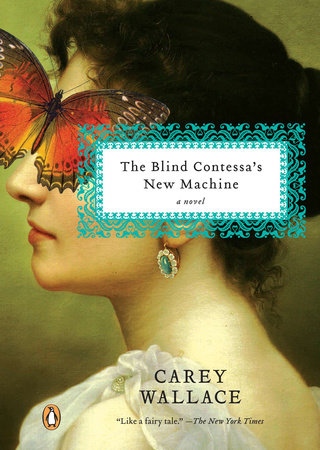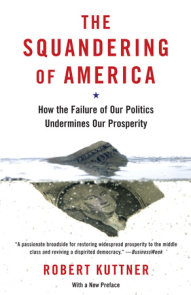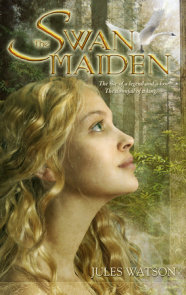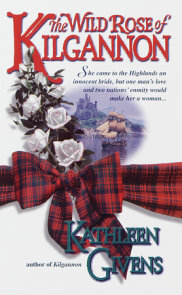READERS GUIDE
Questions and Topics for Discussion
INTRODUCTION
Darkness is closing in on Carolina Fantoni. Slowly, the young contessa’s vision blurs, distorts, and fades. When she tries to warn her parents and fiancé, they dismiss her fears. But Turri, her eccentric neighbor and friend, understands the truth—she is going blind. When Carolina’s sight vanishes forever, he creates an ingenious machine so that she can communicate with him: the world’s first typewriter. His gift is the inspiration for Carey Wallace’s beautifully crafted debut novel, The Blind Contessa’s New Machine, a story of invention and romance set against a lush dreamscape in nineteenth-century Italy.
In fluid, lyrical prose, Wallace details the advance of Carolina’s blindness and of her growing friendship with Turri. Ten years her senior, Turri could not be more different than her husband, Pietro. Turri is reclusive, brilliant, and strange. Pietro is expansive, popular, and spoiled. Both of them struggle to help Carolina as her world is swallowed up in darkness. But Carolina finds the most comfort in the one place she can still see: her dreams, where she finds a freedom she never experienced even before her sight was snuffed out.
When Carolina’s sight leaves her, her friendship with Turri is threatened. She can no longer easily reach the lake house where they’ve always met. Longing to communicate with her, Turri invents the world’s first typewriter. Carolina’s gratitude ignites a passionate affair—but the evidence the machine creates may ruin them both.
Based on the true story of the invention of the typewriter, the novel delicately traces the romantic complexities of Carolina’s story, and explores invention of all kinds: not just the new machine, but dreams, lies, and imagination. Wallace deftly weaves together the intricacies of plot and imagery, language and emotion, brilliantly conveying her characters’ desire for each other and the terror and sensuality of Carolina’s world. An exquisite jewel of a novel, The Blind Contessa’s New Machine negotiates a line between history and fairy tale, and is equal parts dream, passion, and genius.
ABOUT CAREY WALLACE
Carey Wallace was raised in small towns in Michigan. She has worked as a waitress, private biographer, and lady’s maid. She is the founder of The Hillbilly Underground, an artists’ retreat in rural Michigan. She currently resides in Brooklyn, N.Y. This is her first novel.
A CONVERSATION WITH CAREY WALLACE
Q. You begin the book with a quotation from a poem by Wendell Berry. What drew you to this quote? How does it reflect the spirit of the novel?
To me, Wendell Berry’s lines mirror the story of The Blind Contessa’s New Machine. We can think of the blind bird in two ways, he says, either as a trapped creature whose feet are “netted with darkness” or as a creature whose blindness has set her free to fly infinite distances (“her heart’s distance,” or anything she desires, and “the distance in her eyes” which is now infinite, because she is blind). Like the blind bird, Carolina’s suffering eventually leads her out into a new freedom. I also love the element of hope built into the beginning of the quote with the words “until morning comes.” The darkness in Berry’s poem isn’t permanent. In fact, the coming of new light is the first fact we hear, before blindness is even mentioned, and that hope should inflect everything that comes after it.
Q. The Blind Contessa’s New Machine is based on a somewhat arcane piece of history. When did you first discover the story? How much of the novel is taken from life?
I discovered the historical kernel of The Blind Contessa’s New Machine while researching the invention of carbon paper to make sure that it wasn’t an anachronism in another story I was writing. Since there were no typewriter ribbons available when Turri invented his machine, he invented the earliest carbon paper, covered with ash, at the same time, and has credit for that invention as well. From there, I stumbled onto the story of the invention of the typewriter itself. The basic details are all true: Pellegrino Turri did invent the world’s first typewriter for Carolina Fantoni in 1808. (In fact, many early typewriters were conceived of as writing aids for the blind). The two of them did carry on a correspondence while married to other people. The machine was returned to Turri’s family on Carolina’s death. At the time, however, nobody knew that his invention was the first example of a machine that would someday be a fixture on desks around the world, and the machine itself does not survive—only a handful of the original letters Carolina wrote on it.
Q. When writing a novel, is it helpful or challenging to have the story grounded in historical fact? Do you feel an obligation to the actual people involved?
It’s wonderful to work with a true historical event in the same way that it’s wonderful to work with a poetic form like a haiku or sonnet: you’ve got a structure to work in, certain landmarks along the way, instead of just wandering in the wilderness. I did think long and hard about honoring the real Carolina and Turri, though, especially since the very limited historical record isn’t clear on whether they were ever more than friends, and I didn’t want to accuse them of unfaithfulness to their own spouses, who they might genuinely have loved and to whom they might have been loyal. In the end, I decided that readers were sophisticated enough to recognize that this is a story that is more fairy-tale than history, that Carolina herself would probably be delighted to explore the world I’d built for her, and that Turri might be happy to get the added credit for his invention.
Q. Do obstacles make love more enduring or passionate? Has that been true in your own life?
Love is a mystery and it looks different for every person. In general, my feeling is that life is hard all by itself, and that there’s no need to go looking for trouble in our relationships: they should be a place where we find comfort and rest. That said, I’ve never seen a good relationship that wasn’t hard-won on some level.
Q. Many people believe that blindness heightens other senses; Carolina’s love of music supports this. In some ways, do you think Carolina has a more rich experience of the world than if she hadn’t lost her sight?
Carolina absolutely has a richer experience as a blind woman than she would have had sighted. Her blindness forces her to develop a rich imaginative world, and eventually she learns to exert a control there that she could never hope to have in her society. The crisis her blindness creates in the story also forces a degree of honesty in her marriage at which she and Pietro might never have arrived otherwise. Whether that’s a cause for hope or not is an open question.
Q. Not only is Turri’s writing machine useful but it underscores the romantic value of a letter. Do you think that the love letter is a dying art?
People seem to worry a lot about dying arts, but what I see is a lot of new invention. We may not see as many pen and ink missives as we used to, but now we can send a message to a loved one in another country with a click of a button, and pass notes from one end of the city to another by text. Something’s lost and something’s gained. What remains is both love itself and the deep human desire to learn by hearing stories, and I don’t believe either of those has changed much, or will ever change.
Q. Do you have any special interest in typewriters?
I have never been able to leave a typewriter behind at a Salvation Army or a tag sale, a fact which my brother used to remind me of bitterly every time he helped me move, as he carried the heavy machines back and forth. While I wouldn’t call myself a seasoned collector, I do have a beautiful Smith Corona with green racing stripes, a sleek Olivetti in a turquoise case, and one of the standard Royal desktop monsters that must weigh forty pounds, among others. When my brother found out this book was being published, all was forgiven: he actually decided to add to the collection with a typewriter-shaped music box that plays the alphabet, in celebration.
Q. It could be argued that writers are a type of inventor. Do you feel you have anything in common with Turri?
I’m something of a detective when it comes to the creative process, always picking up clues about how other people do it, and I’m amazed by how universal the experience is, whether you’re writing a book or inventing the sewing machine (which Singer did in a dream). What’s most interesting to me is the fact that it doesn’t seem to be about hard work, but about listening to something being broadcast from a station that only we can receive. Of course, since both the world and our own minds are full of noise, listening for that station is in some ways the hardest work of all.
Q. Most writers encounter some sort of creative frustration during the course of writing a novel. Did this happen to you? How did you handle it?
Believe it or not, the original draft of The Blind Contessa’s New Machine was about seventy pages shorter than the final version. It began as Carolina’s sight began to leave her, and her blindness shadowed the entire draft. But that manuscript fell into the vast no-man’s land between a short story and the modern idea of a novel, and while some people liked it, no one would publish it. I always like to think about writing as a mining operation, and I didn’t know if I had any more of the story in me. But I decided to climb back down one more time and take a look around. What I discovered was the entire section dealing with Carolina’s childhood, which adds a visual richness to the book, and also gives more emotional weight to her relationship with Turri and her eventual loss of sight.
Q. Do you have any authors whose work you turn to when seeking inspiration?
Penelope Fitzgerald is my favorite modern author. She began writing fiction to entertain her dying husband when she was already over sixty, and won a Booker Prize fewer than five years later. Her books are slim, intelligent, beautiful, and so strong you can get drunk on the first sip. She’s got a sharp eye, but a generous heart—a rare combination. And she can set her novels convincingly in Russia, Italy, or on the Thames. Julio Cortáazar is the writer I name most often as my favorite: even in translation, his writing breaks into some category beyond prose, and his books work more like dreams than stories. I love Hawthorne best among American authors, followed by Raymond Chandler, F. Scott Fitzgerald, and Tennessee Williams, along with a deep affection for Cornell Woolrich, whose hypnotic prose I sometimes think works not in spite of but because of its imperfections. Dostoyevsky and Tolstoy are always the cornerstones of anything I’ve managed to learn about books, balanced on the side of wonder by Borges and Marquez. A portrait of the Brontë sisters, with their brother Branwell painted out, has hung over my desk since I was a teenager. I’ve read both Gone With the Wind and The Count of Monte Cristo many times. I read Thomas Merton almost daily. And Flannery O’Connor helps me in a host of ways, not least of which is her sheer cussedness.
Q. You founded The Hillbilly Underground, an artists’ retreat in Michigan. Can you tell your readers more about it?
My brother and I started the Hillbilly Underground to encourage people we knew who had talent to use it. Every summer, we invite a group of artists out to our grandfather’s cottage, and promise to feed them and put them up for the week. The cost of entry: they have to work on a creative project. My brother sets up a recording studio in the garage, I go to work in the bedroom, painters set up easels under the trees at the top of the hill, filmmakers take footage on the lake from the rowboat, and every night I make a big dinner, after which everyone plays poker until well into the night. Over the years, we’ve hosted some reasonably important artists, but most important, we’ve seen a lot of new work get done, including The Blind Contessa’s New Machine, which I started there in July 2007.
Q. What are you working on now?
I’ve got a few ideas I’m kicking around, one about a ghost, and one about an outlaw.
DISCUSSION QUESTIONS




















